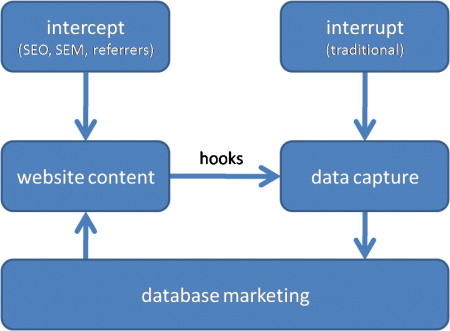The Archives
-
Internet, Marketing, tourism bc
Tourism BC 2010 Online Olympics activities: #8 – grow our consumer database
We want to mitigate the risk that when the games are over, we’ll be out of sight, out of mind. All activities are geared towards making sure the impression we make is a big one and over the last few days I’ve shared our strategies to maximize the destination awareness and get people to start thinking about a possible visit by visiting our consumer websites.
Part of our post-games strategy is to be pro-active when the games are over and we’re putting a lot of energy into growing our consumer database. That way, we don’t have to rely on people remembering BC is great, but we can pro-actively tap them on the shoulder and remind them. Our database marketing program has evolved into sophisticated event based communication, customized to individual consumer profiles. The more consumers we can add to the database, the better guarantee for success.

The chart above show our model for our typical approach to driving website visitation and data capture (growing our consumer database).
Intercept
Intercept tactics are targeting consumers who are specifically looking for information we provide. And in previous posts I already described some of the main activities we’re engaged in during the games; SEO/SEM and referral links. These tactics are proven to be very effective at driving highly qualified visitors.
Interrupt
Interrupt tactics are more traditional and includes things like online display advertising. These tactics aren’t necessarily targeting people who are looking for our information but target the people who fit our target audience. They might be looking for something else like medal standings and the purpose of the advertising is to get them interested in our message.
That’s why we use very direct and strong call-to-actions. In the case of the Olympics, a contest to win a trip to BC. We’ve learned that interrupt tactics aren’t the most effective at driving website visitation, but very effective at growing our consumer database (data capture).
Hooks
Intercept tactics drive a lot of qualified visitors to our website. We try to grow our consumer database by leveraging these visitors through hooks. Hooks are tactics on the website with the purpose of growing our consumer database (data capture). We run contests, offer free brochures, maps, eNewletters and more. It’s like fishing in your own pond by adding value to the consumer.
Putting it all together
We use the model above to make investment decisions. For example (note: completely fictional numbers): if it costs $25 to get add a consumer to our database through an interrupt tactic, and we add 1% of our website visitors to our database, a cost per click of $0.25 through a PPC campaign would achieve the same results from a data capture perspective. Plus we’d get 100 qualified people on the website.
Finding the right balance between all objective leads to the right investment strategy.
-
Internet, Marketing, tourism bc
Tourism BC 2010 Online Olympics activities: #6 – SEO & SEM
02.19.10 | Permalink | 2 CommentsSearch Engines have been our biggest source of website visitation for years now. Search Engine Optimization and Marketing is also a long tail strategy. In 2009, over 500,000 unique queries drove visitors to HelloBC.com, accounting for 80% of visitors in 2009.

Still from the NBC’s opening ceremonies pre-showPeople watch TV with a computer close by. All it takes is that one beautiful shot to make somebody interested in British Columbia. And the obvious place to go when you see something and want to learn more is a Search Engine.

Search volume for the keywords ‘beijing travel’ during the 2008 gamesThe chart from Google Insights for Search above shows the increase in search volume for the keywords Beijing travel. It demonstrates the games generates increased interest in a destination and consumer behaviour on search engines. Taking advantage of this search activity to move consumers closer to a trip to BC has been one of our top priorities in our Olympic strategy.
Organic Search
We’ve been working on improving organic search traffic for a number of years and the results have paid off. Good content covering everything BC has to offer (more about in a laster post), combined with the right technical implementation has resulted in 60% increase of organic search visitors this year alone. Chances are high that something peaks somebody’s interest during the games, the organic search results will point to HelloBC.
And so far organic search has spiked significantly during the games, with daily organic search visitors more than doubling the highest organic search day last year.
Paid Search
To compliment our organic traffic, we run pay-per-click campaigns on the major search engines. A strategy was developed with our SEM agency Enquiro in Kelowna with the help from all three main search engines. PPC campaigns allow us to fill in gaps in our SEO efforts and target Olympic related keywords that meet our KPI’s in priority markets.
We maximize our large set of ad-groups containing our regular destination related keywords.Somebody who’s interested in anything BC related as a result of the games will be intercepted with one of our regular ads.
During the games, we compliment these adgroups with specific Olympic related adgroups. Those are keywords that relate directly to the games but people still might use to learn more about the destination. We’ve used the months prior to the games to fine tune our campaigns and find Olympic related keywords that meet our KPI’s. And even during the games, we monitor things closely, adjusting our campaigns on a daily basis to find the gems in Olympic searches.
-
Internet, Marketing, Travel & Tourism
Marketing your small tourism business in the 21th century: #6: Be found in Search Engines
04.26.08 | Permalink | 4 CommentsThe first 5 topics have been focused on giving people a remarkable experience, encouraging people to talk about it, and give resulting interested consumers access to your website to close the sale.
And how will people find your website if there’s mention or link to your website? A Search Engine of course. Travel planning starts with a Search Engine. People don’t even bother remembering URL’s anymore (in the Japanese subway, they now advertise Search Terms instead of URL’s). You need to be found in Search Engines. The art and science of making sure you have good placement in Search Engines is called Search Engine Optimization (SEO). Paying for those little ads on the side of the results is called Search Engine Marketing (SEM).
The most important thing is when somebody searches for the name of your business, your website has to show up high. Start by testing this out. Just search for your name and check if you’re in the top results. Make sure you also check for other ways people might search for your name. Also search for your name plus the name of your city or community. Unless you have a common name, your business should be #1, #2 or #3.
If you don’t show up at all, you have a big problem. And if you don’t show in the top 5, you still have a problem. In most cases it means your web professional hasn’t considered Search Engines when building your website. For a list on how to make your website Search Engine Friendly, check our these guidelines from Google’s Webmaster Central (or send the list to your web professional). Start there, and in a later post I’ll share what else you can do to improve your SEO. If you can’t wait, check Search Engine Watch.
The second thing you can do in Search Engines is pay for placement. Create an ad in a Search Engine for specific keywords and you pay each time somebody clicks to your website (Pay Per Click, or PPC). Managing PPC campaigns is a specialist skill, but if you stick to the basics, you can experiment with this yourself. You can manage you Search Engine Ads in Google, Yahoo and MSN through self service and a credit card. There are four core tactics to consider; the keywords you target, your bid, the copy of your ad, and your landing page.
My recommendation is to start very specific and slowly broaden things out. Start with very specific keywords. If you are ACME Golf course in Someville. Target the keywords “ACME Golf” and “Golf Someville” for example. Don’t target “Golf”. If might drive a lot of traffic, but it will also drive up cost and it’s unlikely they will convert into a visitor. Choose the geographic area where your ads will show carefully. Where does your typical visitor come from? Start there. Be carefull how much you bid, and set limits so you don’t blow through your budget. And most of all, monitor the results. What’s working, what’s not working, and adjust frequently.
You probably realize that it can get complicated and time consuming quickly. So think twice before you engage in this and consider hiring a professional to manage your SEM. It’s worth it.
Previous entries in this series:

